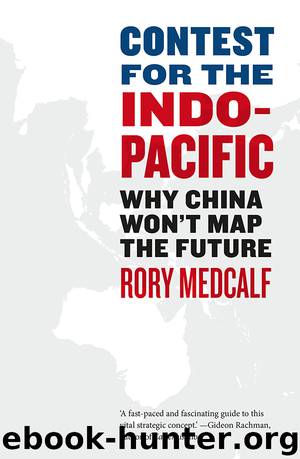Contest for the Indo-Pacific by Rory Medcalf

Author:Rory Medcalf
Language: eng
Format: epub
Publisher: La Trobe University Press
The global region
Like Russia, Europe has plenty else to worry about. Strikingly, however, even as the European ‘holiday from history’ has come to an end, and security, economic and political problems have amassed close to home, some key European countries and the EU more generally have begun to take the Indo-Pacific seriously, for the first time in many years. Europe has long been focused on Asia, especially China, as a place of commercial opportunity, and many European countries initially welcomed the Belt and Road solely through that prism. Meanwhile, European corporations are established arms suppliers to the region. But a more nuanced and risk-conscious European engagement with the Indo-Pacific is emerging. This is driven by a recognition of economic interest in the sea lanes, the geoeconomic subtext to the Belt and Road, the global nature of China’s cyber and intelligence activities, and the overall risk to the liberal international system from resurgent great-power tensions.
Paris has led the shift, wholeheartedly endorsing the Indo-Pacific concept as being at the heart of its global strategy.50 France can claim to be a genuine Indo-Pacific power, given its many island territories in the Pacific and Indian oceans, which give it enduring command over the largest exclusive economic zone of any nation. France has 1.5 million citizens, 8000 troops and a small naval fleet permanently stationed in those territories, augmented by long-range ship visits such as the aircraft carrier Charles de Gaulle in 2019.51 It is strengthening security ties in particular with India, Australia and Japan. India and Australia are among France’s foremost arms customers. Amid strains on the rules-based global order – coming from China, Russia and America – President Macron has spoken up for liberal-democratic principles in the Indo-Pacific, talking openly of the need to discourage Chinese ‘hegemony’.52
French and British warships have transited contentious waterways – the South China Sea and the Taiwan Strait – to reinforce the normality of law-based freedoms to use the sea. Germany is contemplating doing the same. But entirely reasonable questions can be asked about the seriousness of this European commitment to Asia. Would a distant country like France really put its forces and economy at risk in a maritime confrontation with China? While dealing with the consequences of Brexit, how much diplomatic capital will Britain really invest in, say, the rights of Hong Kongers or Uighurs? Britain is notably reinvesting in its diplomacy east of Suez – opening more posts, deploying more staff – but the overall strategy remains uncertain. Consumed with Brexit, British policy-makers were still debating in 2019 whether to formally recraft British regional engagement as an Indo-Pacific rather than Asia-Pacific policy.53 Nonetheless, European powers, the EU collectively, and Britain are now looking at the Indo-Pacific through more than a commercial lens.
For somewhat ‘external’ players like Europe or Russia, it is unclear how much is truly at stake in the Indo-Pacific. But for the many nations resident in the region, there is no question: they have everything to gain – or lose. Small islands states in both oceans are finding themselves terrain for the rivalries of large powers.
Download
This site does not store any files on its server. We only index and link to content provided by other sites. Please contact the content providers to delete copyright contents if any and email us, we'll remove relevant links or contents immediately.
| Arms Control | Diplomacy |
| Security | Trades & Tariffs |
| Treaties | African |
| Asian | Australian & Oceanian |
| Canadian | Caribbean & Latin American |
| European | Middle Eastern |
| Russian & Former Soviet Union |
The Secret History by Donna Tartt(19027)
The Social Justice Warrior Handbook by Lisa De Pasquale(12182)
Thirteen Reasons Why by Jay Asher(8883)
This Is How You Lose Her by Junot Diaz(6872)
Weapons of Math Destruction by Cathy O'Neil(6260)
Zero to One by Peter Thiel(5782)
Beartown by Fredrik Backman(5734)
The Myth of the Strong Leader by Archie Brown(5491)
The Fire Next Time by James Baldwin(5423)
How Democracies Die by Steven Levitsky & Daniel Ziblatt(5211)
Promise Me, Dad by Joe Biden(5139)
Stone's Rules by Roger Stone(5078)
A Higher Loyalty: Truth, Lies, and Leadership by James Comey(4946)
100 Deadly Skills by Clint Emerson(4911)
Rise and Kill First by Ronen Bergman(4775)
Secrecy World by Jake Bernstein(4738)
The David Icke Guide to the Global Conspiracy (and how to end it) by David Icke(4696)
The Farm by Tom Rob Smith(4500)
The Doomsday Machine by Daniel Ellsberg(4481)
